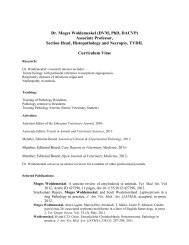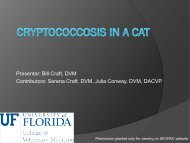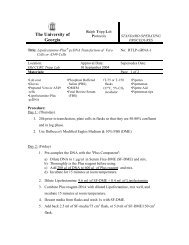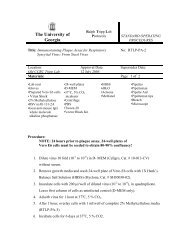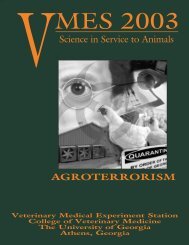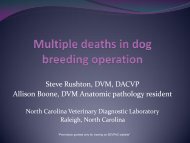Fall 2012/Winter 2013 Aesculapian Magazine - University of ...
Fall 2012/Winter 2013 Aesculapian Magazine - University of ...
Fall 2012/Winter 2013 Aesculapian Magazine - University of ...
Create successful ePaper yourself
Turn your PDF publications into a flip-book with our unique Google optimized e-Paper software.
passed in animal feces. The eggs hatch and develop into<br />
worm larvae, which then crawl onto the grass. Livestock<br />
become infected when they graze on the pasture and ingest<br />
the larvae.<br />
If animals are allowed to graze freely on large, open<br />
pastures, they will naturally tend to favor some segments<br />
<strong>of</strong> the pasture more than others. As they congregate more<br />
in those areas, they come in contact with more fecal matter<br />
and, consequently, more parasites, he said.<br />
A simple solution to this problem is to divide the<br />
pasture into segments with fencing and to periodically<br />
rotate animals to new grass. The new areas have fewer<br />
parasites, and many <strong>of</strong> the parasites left behind on old<br />
pasture will die naturally before the animals return.<br />
“This decreases exposure,” Kaplan said. “Although it’s<br />
the same number <strong>of</strong> animals on the same amount <strong>of</strong> land,<br />
by rotating pastures, the animals are less exposed to the<br />
parasites and have less need for treatment.”<br />
These methods have proven successful in farms<br />
Kaplan has visited where parasite drug resistance was<br />
extremely high, and he hopes that they serve as an example<br />
Haemonchus contortus worms in the stomach <strong>of</strong> a sheep. You can see<br />
the “barber pole” appearance <strong>of</strong> the worms. Photo courtesy <strong>of</strong> the<br />
Kaplan Lab.<br />
to other farmers who might be hesitant to adopt the simple,<br />
more sustainable approach.<br />
“If you use a drug to kill an infectious agent such as<br />
bacteria, viruses or parasites, eventually you probably will<br />
get drug resistance,” Kaplan said. “But how rapidly that<br />
occurs, whether it occurs over several years or several<br />
decades, will be determined by how the drug is used.”<br />
Don’t miss the College <strong>of</strong> Veterinary Medicine’s next<br />
OPEN HOUSE<br />
Friday, April 5th, <strong>2013</strong><br />
For more information or for directions to the College, please visit us at:<br />
www.vet.uga.edu/openhouse



